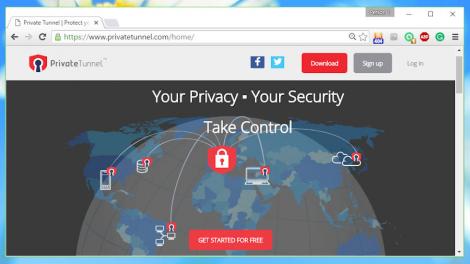

Protecting your privacy online sounds like a good idea in theory, but in practice it’s hard to achieve. The internet is a very public network, and most computers leak a lot of information from the moment they connect.
Connecting to a virtual private network, or VPN, could make all the difference, cloaking your identity and keeping your online activities hidden from hackers, governments, or even your own ISP.
As you might have guessed, PrivateTunnel is one such VPN service, based in Canada and actually a commercial arm of OpenVPN Technologies, the people behind the OpenVPN networking protocol.
The company’s major selling point is its pay-as-you-go VPN plans. Instead of signing up for a regular subscription, you’re able to buy a block of data – 20GB for $9.99 (£7.60, AU$13.30), 100GB for $19.99 (£15, AU$27) – which never expires, and works with unlimited devices or connections.
Alternatively, signing up for the free plan gets you 2GB as we write, and you can earn an extra 2GB for referring friends.
If that sounds like too much hassle, the more familiar Unlimited plan gives you unlimited data and supports up to 10 simultaneous devices for $29.99 (£23, AU$40) per year.
All products allow connections to 12 servers in nine countries (six in Europe, four in the US, two in Japan).
If you spend money but have problems with the service, you may be able to get a refund, although there are a few conditions attached.
PrivateTunnel’s policies mostly consist of the standard clauses you’d expect – we can’t guarantee the service works all the time, don’t do illegal things, we’ll close your account if we get any complaints, and so on.
The ‘we don’t log your actions’ bit is a little vaguer than usual. Rather than, for example, rival VPN Hide.me’s emphatic "our network simply cannot log your information, it is just built that way", PrivateTunnel says logs "are not used for monitoring or censoring your internet activities". Sounds good, but could they be? What data is recorded? It’s not clear.
What the firm does say is that data is recorded "for the purpose of identifying abusive users". PrivateTunnel doesn’t clarify what "abusive" means, but other clauses point out that you must not "run any resource intensive programs that will interfere in the usage of our services by our users", and that "you will not hog the bandwidth of our servers".
Reasonable? Maybe, though it depends how much of a hog you need to be to cause problems. We’d guess this is unlikely to be an issue with the pay-as-you-go accounts, but the Unlimited plan might be different. Keep in mind it’s the data that’s unlimited, not the bandwidth.
PrivateTunnel’s PC client is extremely basic. Log in, connect to your last-used server or select another, then connect and disconnect with a click.
Any data remaining from your allowance is clearly displayed, counts down every minute or two, and there’s a button to buy more credit as necessary.
None of this is particularly polished, and there are a few irritations along the way. For example, when we clicked to connect, PrivateTunnel got us online very quickly, but desktop alerts (with a warning sound) continued appearing for the next 15 seconds. "Connecting… Loading configuration… Assigning IP address… Connected…"
There are also vanishingly few settings: a launch at boot option, a time between reconnect attempts, and the OpenVPN protocol type (adaptive, UDP, TCP, HTTP Proxy, OBFS Proxy).
Once we were online, testing showed the service properly concealed our identity – there were no leaks.
PrivateTunnel wasn’t any great shakes in our performance tests*. Download speeds were the highlight at only 10% down from our non-VPN rates, but upload speeds fell by 73% and latency was 92% up. Other servers may have been faster, but there’s no information on ping time or load to help you choose. And of course, with only 12 locations there’s not much choice anyway.
PrivateTunnel is cheap, and if you make light but regular use of VPNs then its pay-as-you-go approach may appeal, but otherwise we’d look elsewhere.
*Our testing included evaluating general performance (browsing, streaming video). We also used speedtest.net to measure latency, upload and download speeds, and then tested immediately again with the VPN turned off, to check for any difference (over several rounds of testing). We then compared these results to other VPN services we’ve reviewed. Of course, do note that VPN performance is difficult to measure as there are so many variables.
Source: Tech Radar